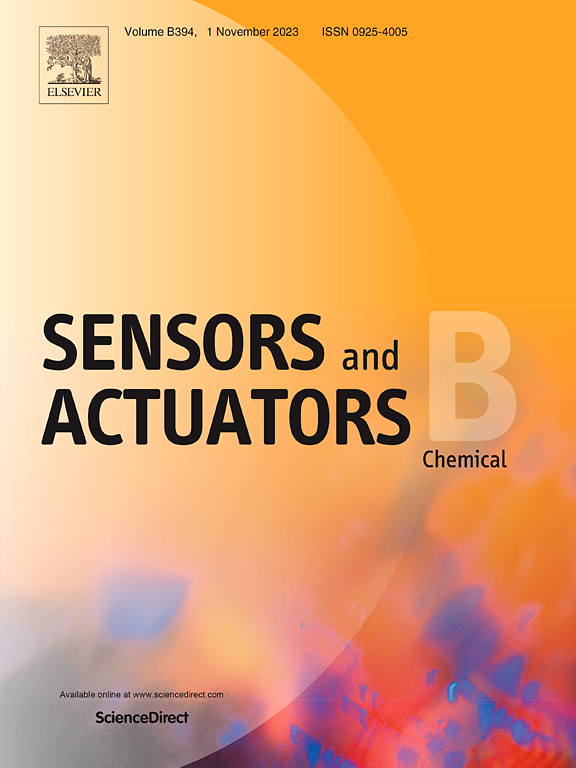基于微波的无标记免疫传感器检测抗 p53 自身抗体
IF 3.7
1区 化学
Q1 CHEMISTRY, ANALYTICAL
引用次数: 0
摘要
血液中的抗p53自身抗体浓度与早期肿瘤形成有关,使该分子成为一种有希望的癌症生物标志物,包括早期结直肠癌(CRC)的诊断。本文首次利用微带传输线技术设计了一种微波无标记生物传感器,用于检测抗p53自身抗体(anti-p53 Aabs)。该生物传感器集成了一个p53抗原功能化的铜表面,该表面与样品中的抗p53抗体相互作用,并利用50-Ω微带线和优化的阶进阻抗谐振器(SIRs)在5.2 GHz谐振,以传导p53-抗p53抗体相互作用。实验结果表明,该传感器在250 ~ 1250 pg/ml范围内具有良好的线性响应,灵敏度为0.104 MHz* ml /pg,检出限为316.5 pg/ml。利用微带生物传感器的高灵敏度、小型化和实时监测的固有优势,可以为抗p53抗体和其他癌症相关生物标志物的无创和无标签检测提供一种革命性的方法,有助于填补当前生物传感器技术的重大空白,并解决肿瘤诊断中未满足的需求。本文章由计算机程序翻译,如有差异,请以英文原文为准。
Microwave-based label-free immunosensor to detect anti-p53 autoantibodies
Anti-p53 autoantibody concentrations in the bloodstream have been linked to early tumor formation, making this molecule a promising cancer biomarker, including early colorectal cancer (CRC) diagnosis. Herein, a microwave-based label-free biosensor was designed for the first time by microstrip transmission line technology to detect anti-p53 autoantibodies (anti-p53 Aabs). The biosensor integrates a p53 antigen-functionalized copper surface that interacts with anti-p53 Aabs from samples and utilizes a 50-Ω microstrip line with stepped impedance resonators (SIRs) optimized to resonate at 5.2 GHz to transduce the p53-anti p53 Aabs interaction. Experimental evaluations showed that the biosensor could detect binding events with a linear response from 250 up to 1250 pg/mL, a sensitivity of 0.104 MHz*mL/pg, and a limit of detection (LOD) of 316.5 pg/mL. Leveraging the inherent advantages of microstrip-based biosensors of high sensitivity, miniaturization, and real-time monitoring could provide a transformative approach to non-invasive and label-free detection of not only anti-p53 Aabs but other cancer-related biomarkers, helping fill a significant gap in current biosensor technology and addressing an unmet need in oncology diagnostics.
求助全文
通过发布文献求助,成功后即可免费获取论文全文。
去求助
来源期刊

Sensors and Actuators B: Chemical
工程技术-电化学
CiteScore
14.60
自引率
11.90%
发文量
1776
审稿时长
3.2 months
期刊介绍:
Sensors & Actuators, B: Chemical is an international journal focused on the research and development of chemical transducers. It covers chemical sensors and biosensors, chemical actuators, and analytical microsystems. The journal is interdisciplinary, aiming to publish original works showcasing substantial advancements beyond the current state of the art in these fields, with practical applicability to solving meaningful analytical problems. Review articles are accepted by invitation from an Editor of the journal.
 求助内容:
求助内容: 应助结果提醒方式:
应助结果提醒方式:


